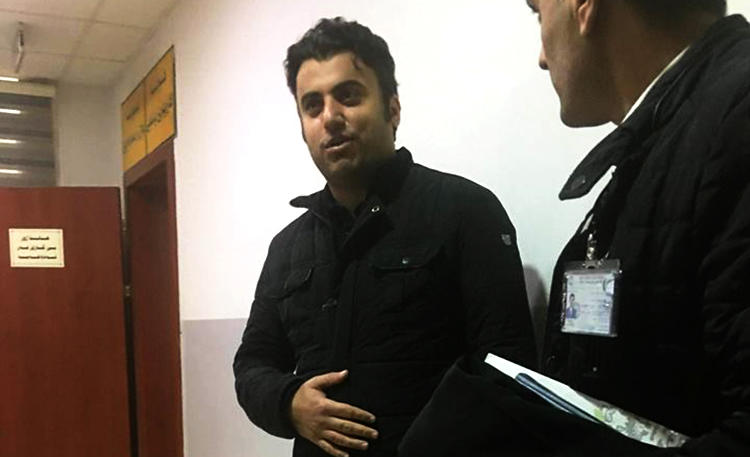New York, October 8, 2020 – Iraqi Kurdish authorities should disclose any charges against journalist Sherwan Amin Sherwani or release him immediately, the Committee to Protect Journalists said today.
Yesterday, a group of 10 police officers raided Sherwani’s home in Sebiran, a village on the outskirts of the Iraqi Kurdish city of Erbil, and arrested him, according to a report by the Metro Center for Journalists’ Rights and Advocacy, a local press freedom group, and Sherwani’s wife, Rugesh Izzaddin Muheiadin, who spoke to CPJ via messaging app.
Sherwani frequently contributes reporting on human rights issues, Turkish airstrikes in the region, and other local topics to the independent news website Kiwan, and covers those issues and provides political commentary on his Facebook account, she said.
Muheiadin told CPJ that the police officers, four of whom were in plainclothes, arrived at their home at 4:30 p.m., seized the journalist’s two laptops, his notebooks, and some CDs, and held a gun to Sherwani’s head and handcuffed him, pushed him into a car with tinted windows, and drove away. She said the officers provided a warrant for Sherwani’s arrest, but neither the warrant nor the officers said why they were taking him.
Muheiadin told CPJ she does not know where Sherwani is being held or if any charges have been filed against him.
“Kurdish authorities in northern Iraq must disclose any charges against journalist Sherwan Amin Sherwani; if they cannot do so, they should release him immediately,” said CPJ’s Middle East and North Africa representative Ignacio Miguel Delgado. “If the Kurdish regional government seeks to operate under the rule of law, they cannot make journalists disappear on a whim.”
In the days prior to his arrest, Sherwani had published posts on his Facebook account, which has over 10,000 followers, criticizing the Kurdistan region’s prime minister, Masrour Barzani, and urging legislators to ask the prime minister about killings of journalists and human rights activists in the region. CPJ reviewed Sherwani’s Facebook account yesterday, but today that link displayed a message saying the account had been taken down. Muheiadin told CPJ that she didn’t know why Sherwani’s Facebook account had been taken down or by whom.
Rahman Gharib, general coordinator of the Metro Center, speculated in the organization’s statement that Sherwani could be charged under either the Law on Misuse of Communication Devices or defamation under the Iraqi Penal Code. If charged and convicted under the Law on Misuse of Communication Devices, he could face up to five years in jail and a fine of 5 million Iraqi Dinars (US$4,200); if convicted of defamation under Article 433 of Iraq’s Penal Code, he could face up to one year in jail and a fine of up to 100 dinars (about 8 U.S. cents).
Sherwani was previously arrested on January 28, 2019, in Duhok, and was held for 42 days on allegations of committing acts against the security of the state, according to CPJ reporting at the time. In April 2012, Sherwani was arrested without a warrant and held for several days over two articles alleging government corruption, according to CPJ research.
In a statement sent to CPJ via email on October 11, Dindar Zebari, the Kurdistan Regional Government’s coordinator for international advocacy, said that Sherwani had been arrested under Article 156 of the Iraqi Penal Code, which states that any person who violates the independence, unity, or security of the country can be punished with life imprisonment.
Zebari wrote that, during the preliminary investigation, Sherwani had confessed to receiving funds from abroad to fuel public disturbance, defame social and political figures, promote vandalism during peaceful protests, and threaten judges. He added that Sherwani had been arrested outside his capacity as a journalist.
On October 13, Muheiadin told CPJ via messaging app that she believed Zebari’s assertions were false, and she said she did not feel it was likely that Sherwani made the alleged confession.
[Editors’ note: This article was updated to include Zebari’s response to CPJ and Muheiadin‘s response to that statement.]
